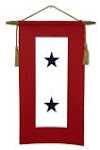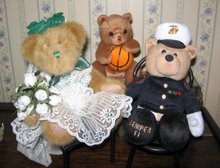BLACK WATCH
Scottish National Theatre production,
presented in Toronto at the
Luminato Arts and Creativity Festival
 We (me and the spouse) were at a considerable disadvantage watching this play because almost the entire cast had thick Scots accents. While I'm better at deciphering this than a lot of folks, for me the accents rendered about 60% of the dialogue incomprehensible. [Correction: 60% of that portion of the dialogue not consisting of the F-word, which turned up at least twice in every sentence.)
We (me and the spouse) were at a considerable disadvantage watching this play because almost the entire cast had thick Scots accents. While I'm better at deciphering this than a lot of folks, for me the accents rendered about 60% of the dialogue incomprehensible. [Correction: 60% of that portion of the dialogue not consisting of the F-word, which turned up at least twice in every sentence.) Accoustics in the hockey arena venue probably exacerbated the problem, but this is a "promenade" style production, performed with the audience on bleachers incorporated into the set structures and playing area, so it's always going to be in a sound-challenged environment. The audibility problem meant that I never heard the names or ranks of any of the characters, which made it impossible to know which actor was which, and how well he was developing his character.
On the other hand, we were at a considerable advantage over the entire rest of the audience, in that we were attending the play as guests of a couple whose son is an officer on active duty with the Black Watch, and who has served with the regiment in Basra, Iraq.
So there.
As a piece of theatre, Black Watch is a powerful, well-crafted, and well-acted drama with original touches that successfully integrate the flash-backs and historical background material with the present context of post-war interviews. And it is respectful enough of its subject and its audience to avoid being a rank piece of agit-prop.
That's not to say that the play has no point of view, about both the military and the Iraq war. The slant was clearly there, and when it was most intrusive it rendered the play just, well, silly.
This is perhaps best illustrated by listening to director John Tiffany talk about how the "daft" behaviour of the Black Watch Iraq veterans became the catalyst for Gregory Burke's script. Here's a telly-trailer advertising the play in Britain, which gives a good impression of the production style, and includes the artiste's-eye-view of what the play has to say.
Okay, so the vets are acting a bit crazy and getting into trouble with the police, and the playwright decides to interview them to get their perspective on their war experience.
In addition to that background, there are a few truths with which everyone attending Black Watch should be armed before permitting it to shape one's opinions about this or any other war:
(a) The perceptions of any ten soldiers must not presume to represent those of tens of thousands of their comrades; and there isn't a single soldier alive who, in the glow of attention from a reporter, will not be tempted to embroider on the facts [as Shakespeare advises us, they might well "remember, with advantages," something they have earned the right to do], not necessarily in a self-serving lie, but in a game of yanking a malleable journalist's chain. Furthermore, there is the God-given right of every soldier to indulge in the Gargantuan Gripe, as defined so astutely by LT G at Kaboom;If there is one scene in Black Watch which does speak the truth about the fight in Iraq better than any other, it is the slow motion enactment of a suicide car-bombing. The vets in the pub talk about it to the interviewer, so the audience (if they've been listening carefully -- and could understand what they heard!) knows what's coming.
(b) We have it on good authority -- from the above-mentioned young officer in the Black Watch -- that the men under his command were inclined to daft behaviour and getting in trouble with police before ever setting a toe in Iraq. He had tremendous affection for his men and felt that they made terrific soldiers, but they were, by nature or nurture, rough, short-fused, hard-drinking, street-fighting, and half-mad at the best of times. The discipline of military life may have been the best thing that ever happened to them.
That's not to say that their service in Basra was not terrifying, frustrating, and perhaps even ill-conceived. As recent events have highlighted, the situation in Basra was different from most of what has gone on elsewhere in Iraq, most explicitly in the fact that Al Qaeda was barely a factor-- inter-tribal civil warfare has been the nature of the beast all the way along, and the British, rightly or wrongly, came to believe they could not contribute to the solution.
To be fair, the play Black Watch does give he impression that the soldiers have no quarrel with military missions or discipline (though I would be interested to know from our young friend whether there is any basis for the play's portrayal of a certain slackness in protocol during the more boring stretches of the mission-- something most playgoers would fail to notice, but we military parents do not). What the men do object to is the fact that they were trained to fight, but spent far too much time pinned down inside a fortification, from which they ventured out on patrols that all too often made them sitting ducks.
From what I have read, that is not an inaccurate picture of how it went for the Brits, and for many of the Americans before General Petraeus took command. However, we also have it on good authority (from our young friend, and from the best reporter on the scene with the British, American journalist Michael Yon, here ) that the Brits, including the Black Watch, had a bellyful of some pretty serious fighting.
(c) It is clear from headlines all over that it doesn't take immersion in combat to produce a global outbreak of young people behaving badly. Vast numbers of so-called disaffected youth lash out at society and each other with staggering regularity, and so-called experts offer a thousand reasons why: unemployment, broken families, drugs and gang violence. Combat trauma is at least an easily identifiable source of hostility. But I would suggest that, among the sparks that set off eruptions of uncivil behaviour must be the frustration born of minds incapable of formulating an expression of their feelings.
In times past [not that long past -- say, 50 years], the letters and reminiscences of ordinary soldiers bore witness to the benefits of a substantive basic education: men looking for words to tell of their fear, shock, longing, and suffering, could find them at hand, because the building blocks of conventional schooling had set them to reading Aesop's fables and Caesar's wars, and to memorizing poems, speeches, and passages from the Bible. They had listened attentively while teachers read to them in school, or families told stories and sang ballads to pass the leisure hours. They had paid heed to the experiences of people other than themselves, so that when it came time to put their own experiences into words, and into the context of the human story, they had the tools and the vocabulary to do it.
Young people for whom education has been a self-referential skid over the surface of randomly arrayed information can often find no words to communicate their reality. They can be heard to complain that they have ideas but just can't express them. Not so-- the sad truth is, if you have no words, you have no ideas, period. You have feelings-- twinges and pangs and impressions, ricocheting around an empty box -- but you do not have ideas. Can anything be more isolating and frustrating than that?
And the most evident symptom of this vacuum in our modern age?: the relentless resort to the F-word.
The scene switches to the dusty Iraqi townscape, with the squad taking measured steps, armed and armoured to the teeth, while describing what they see: two officers and an interpreter go to meet a car which has approached in a suspicious manner.
The men
 wait and watch, and then suddenly a massive flash-pot and explosion sound go off at the curtained end of the playing area. The curtain drops to reveal three men suspended on wires, nearly upside down and at contorted angles, a good ten feet off the ground. Their clothing is shredded and red with blood, and over the next thirty seconds or so, they make their writhing way to the ground, as their personal serial numbers and the numerical designation of their degree of injury are called out over a speaker. When they finally land, the action goes back to a real-time flurry of emergency procedures as the injured are evacuated.
wait and watch, and then suddenly a massive flash-pot and explosion sound go off at the curtained end of the playing area. The curtain drops to reveal three men suspended on wires, nearly upside down and at contorted angles, a good ten feet off the ground. Their clothing is shredded and red with blood, and over the next thirty seconds or so, they make their writhing way to the ground, as their personal serial numbers and the numerical designation of their degree of injury are called out over a speaker. When they finally land, the action goes back to a real-time flurry of emergency procedures as the injured are evacuated. This slow-motion picture of the bomb's concussion matches many a description I have read, usually from the survivors of an IED rather than the observers. It was, in my view, the most evocative and brilliantly realistic passage in the play. Which is why the finale -- a much-admired sort of "advance-of-the-troops ballet" -- seems, by contrast, absurd and foolish.
 The production uses the march in formation, with drums and bagpipes, which will appeal to any audience, perhaps in spite of itself-- in spite of what many will disdainfully identify as obsolete, jingoistic spit-and-polish pageantry.
The production uses the march in formation, with drums and bagpipes, which will appeal to any audience, perhaps in spite of itself-- in spite of what many will disdainfully identify as obsolete, jingoistic spit-and-polish pageantry. As the small company do their arm-swinging, high-stepping march and hard right-face turns, running and re-forming all over the playing space, they begin to fall down one at a time, as if wounded in battle. This would have been totally trite but for the fortunate touch that each fallen man was rescued and picked up by his fellows, rejoining the formation for its next charge.
I could have lived with this part, despite its flirtation with triteness. The silly aspect was that it had been preceded by the commanding officer calling the lads together to prepare them for some sort of pivotal confrontation the next day, speaking of it as if it would be a do-or-die turning point in the war for Iraq. He ended his pep talk by calling them to attention and then counting down to the rush into battle-- as if fighting in Iraq was ever, at any time, this type of "big push, going over the top" exercise resembling the trenches of the Great War.
What nonsense. Nothing in the Iraq war, ever, has been a matter of sending wave upon wave of men into a battle line, marching and falling and pushing onward in the fashion evoked by the finale of Black Watch. The toughest fighting has been house-to-house urban warfare, up stairs and down alleys, avoiding booby-trapped rooms or bodies, picking off snipers before they pick off you.
People often accuse the military of fighting the last war, but in the first war of the 21st century it is the spectators -- the pundits, the carping politicians, the mouthy celebrities -- who have been fighting the last war, and the one before that, and the one before that, doing their level best to see a quagmire through every cloud of desert dust. [Early on Donald Rumsfeld tried to fight the next war, the long-distance high-tech robot war of his imagination -- we all saw how well that worked out!]
Playwright Burke, of course, would likely claim that his finale was not trying for the realism claimed for the rest of the play. Rather, it was a universalizing of this particular war into all wars, in all times. "In the end, we aren’t witnesses to the soldier’s experiences alone," wrote John Heilpern in his October 2007 review in the New York Observer, "but to a dance of death."
Blah blah blah. Ho-hum. Talk about trite.... Not to mention irrelevant.
There remains among those who deplore this war an astonishingly stubborn refusal to see that it is a conflict unprecedented in human history: a war that transcends nation, race, territory, and the concept of armed forces as history has understood them. Universalizing any war is a simpleton's game, insulting to all who lived through it and all who desire to learn from it. It is also a game which has never been more pointless, and morally indefensible, than it is now.
I would urge anyone who has the opportunity, by all means, go and see Black Watch. But keep in mind the caveat that it is but one version of one slice of this war's still unwritten history. And it doesn't hurt to have actually talked with one of the "lads" to make sense of the story.
WHAT I'VE BEEN READING:
THE KITE RUNNER,
by Khaled Hosseini
Life in Afghanistan, from the end of the monarchy to the beginning of the end of the Taliban. Excellent. Must rent film.
Tim Russert, 1950-2008
R.I.P.

I've probably only seen Meet the Press a couple of times in my life -- I don't do TV on Sunday mornings. I've seen many a clip from Russert's famous interviews where he dredges up extensive quotations and confronts the speaker with contradictions between his words then and his words now.
I've watched Russert moderate political debates, and have to say that the last one I saw him do was not a credit to his reputation as a fair and insightful questioner.
Sometimes I think I've heard his voice most often doing public service ads for the local radio station in his home town of Buffalo, New York, since I am a frequent listener to WBEN (known affectionately as "Radio Free Canada")-- those ads have now come to an end, and I'll miss them.
The "all-Russert, all-the-time" bathos visible on the major networks, especially CNN, since the man's death has been a spectacle I imagine he would not have cared for, celebrating the mythological importance of news punditry rather than the man himself. But amid the din were enough comments, from enough people who knew him well, representative of every possible viewpoint on the spectrum, that it's fair to say he must have been a helluva guy as well as a newsman of higher caliber than just about anybody else in the business. The arid desert of mainstream television news just got a whole lot dryer -- that can't be good for anybody.
Russert wrote two books: one about being a son, and one about being a dad. Good choice for immortality. Requiescat in Pace.

















